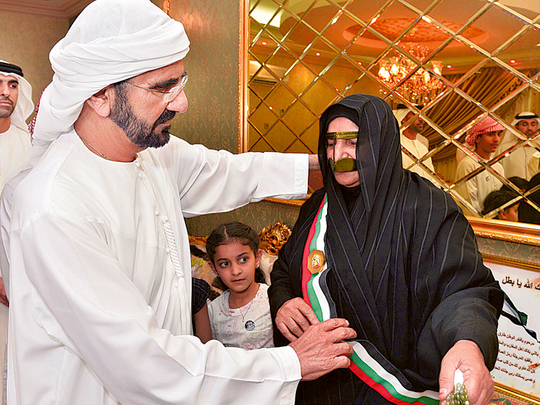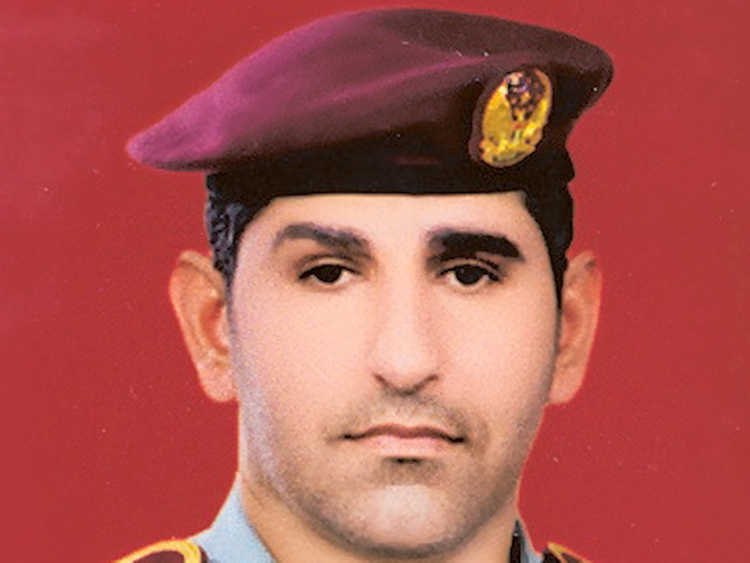
Manama: Three of the people who a court in Bahrain found guilty of killing UAE army officer First Lieutenant Tariq Al Shehi and two other officers in 2014 have been sentenced to death, prosecutors said.
The supreme criminal court also stripped eight of the defendants of their Bahraini citizenship over the March 3 bombing in a village, the deadliest attack since security forces quelled protests in March 2011.
Among the three policemen killed in Diah village was one officer from the UAE. Al Shehi was the first foreign officer killed since Saudi-led troops and police deployed to the kingdom to help the kingdom restore security after the unrest.
“The Court heard that the defendants had planted remote detonating IEDs on the public highway and lured policemen to the scene after staging riots and carrying out acts of vandalism,” Al Hammadi said. “Once security forces arrived at the scene the defendants detonated an IED, which resulted in the deaths of the policemen and injured thirteen others.”
The charges follow an investigation carried out by the Public Prosecution, which found that the first and second suspects formed a terrorist organisation within the framework of the Saraya Al Ashtar terrorist group, he added. “They succeeded in recruiting the rest of the defendants and others with experience in creating and using explosives. Their overarching aim was to form several groups that carry out terrorist acts aimed at killing policemen and destroying vital security facilities and public property in order to disturb public peace and prevent authorities from carrying out their duties,” he said.
“Evidence indicated that the defendants also produced several IEDs and held meetings during which they formulated plans to achieve the criminal goals and objectives of the group. The defendants agreed to exploit the funeral of a deceased individual n close proximity to a security checkpoint, where they planted remotely controlled IEDs. The defendants aimed to entice as many security force personnel to the scene as possible in order to inflict the largest number of deaths and injury.”
They charged that two of the defendants were among the founders of the little-known Al Ashtar Brigades, a group that has reportedly claimed responsibility for several attacks in the kingdom, including a July 2013 bombing outside a mosque.
The Court heard that the night before the incident, the defendants planned the crime by planting three IEDs at the scene and assigned the fourth suspect with detonating the first IED that claimed the lives of the three policemen.
Unidentified members of the organisation were assigned with detonating the two remaining IEDs under the supervision of the third suspect. The fifth suspect was assigned with filming the incident and the rest of the defendants were assigned as lookouts. “On March 3, the defendants staged riots and carried out acts of vandalism in the area where the IEDs were planted in order to lure the security forces to engage with them. The fourth suspect took up a position on top of a building in the area. As soon as the security forces arrived, he detonated the IED using a mobile phone. The two remaining IEDs were not detonated as the second IED was damaged due to the explosion and the security forces did not approach the third IED,” Al Hammadi said.
“Five of the eight defendants referred by the Public Prosecution to the Higher Criminal Court were remanded in custody pending investigation, while the remaining three are still fugitives. The defendants are charged with the organisation and management of a group with the intention to disrupt the provisions of the constitution and prevent state institutions from carrying out their duties. They are charged with using terrorism as a means to achieve the group’s objectives and recruiting individuals and overseeing the production of explosives. They are also charged with targeting police personnel and attempts to weaken state institutions in order to overthrow them.”
Six defendants were charged with joining a terrorist group. They, alongside one other defendant, were also charged with engaging in terrorist activities that led to further charges of murder, attempted murder and the damaging of public property, Al Hammadi said. “The case was held at the Higher Criminal Court where it heard from the defence, affording defendants their full legal rights. The court subsequently heard the Public Prosecution’s statement, which called for the maximum punishment available, which is the death penalty. The court issued its aforementioned verdict and convicted the defendants,” he said.
“The court based its ruling on the evidence provided by the Public Prosecution that confirms the crimes committed by the suspects. The evidence included testimonies from seventeen witnesses and the seizure of materials used in the manufacturing of explosives. The suspects were found in possession of these materials, in addition to mobile phone communications of one of the suspects that confirmed the suspects communicated with each other on the day of the incident and beforehand. Their conversations included the targeting of police officers. The crime scene report showed that the DNA of one of the suspects was found on one of the IEDs that was not detonated.”
Under Bahrain’s laws, the defendants have the right to appeal the verdict at a higher court.
- With inputs from AFP













